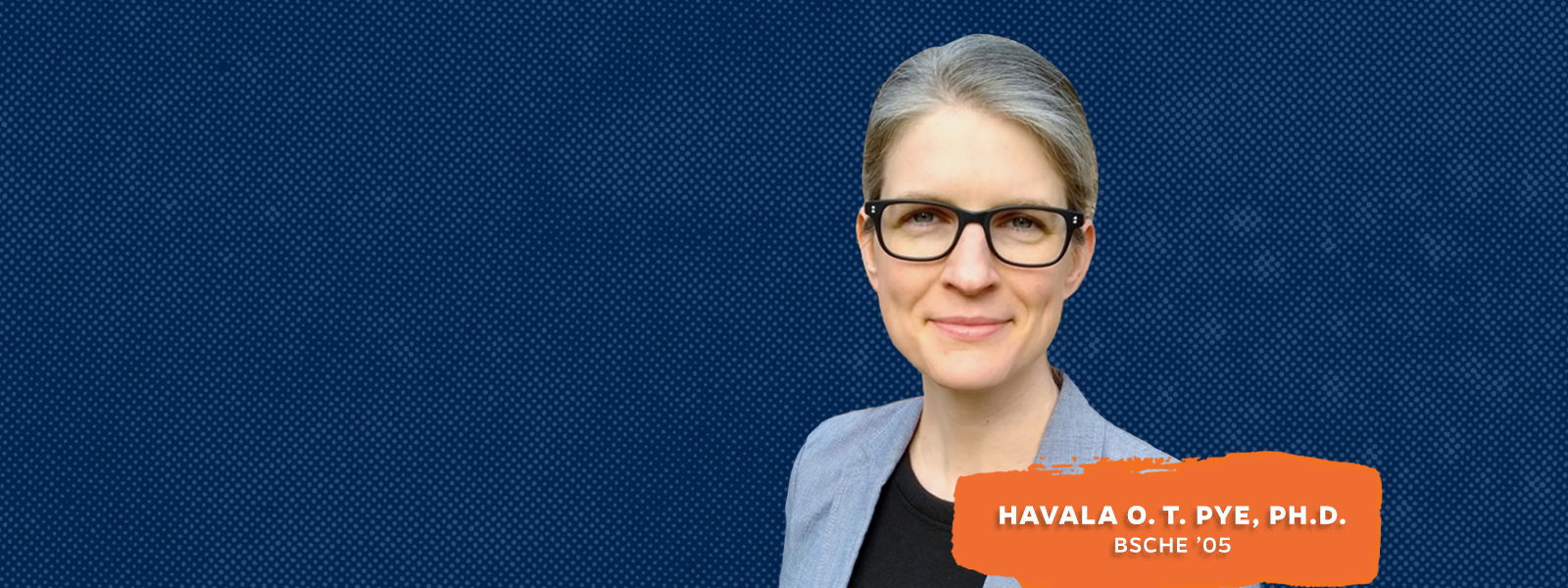Havala O. T. Pye, Ph.D., (BSCHE ’05), Research Scientist at the U.S. Environmental Protection Agency (US EPA), presented to students in the Department of Chemical Engineering how chemical engineering is used in research at a regulatory agency, and what it is like to work for the federal government as a scientist.
Dr. Pye’s work at the US EPA focuses on fine particles and other airborne pollutants that can impact human health and climate change. Specifically, she develops the representation of fine particles and organic species in the Community Multiscale Air Quality modeling system (www.epa.gov/cmaq) allowing for improved quantification of air pollution impacts in regulatory analysis. In addition, methods developed by her team are being used to estimate evaporative air emissions from chemical products as part of the National Emissions Inventory which occurs every three years in the US. She has also worked on biogenic volatile organic compound chemistry, role of volatile chemical products in secondary pollutant formation, deposition to vegetation and other surfaces, and chemistry of suspended condensed phases such as liquid particles.
Dr. Pye has authored or co-authored 54 refereed journal articles with over 4,000 citations, including 5 articles in the Proceedings of the National Academy of Sciences and 1 in Nature Sustainability, as well as given 17 invited talks. Dr. Pye is a topical editor for the journal Geoscientific Model Development and the recipient of multiple EPA Scientific and Technological Achievement Awards as well as a bronze medal for commendable service. In 2017, she was recognized with a Presidential Early Career Award for Scientists and Engineers, the highest honor bestowed by the U.S. government on scientists and engineers beginning their independent careers.
Q: What was the best aspect of your experience at UF CHE?
A: UF provided an outstanding education and great training in chemical engineering. I remember taking many excellent classes, particularly in my degree field, but also in terms of electives that supported my core curriculum.
Q: What is your favorite memory of your time as a student?
A: I’m not sure I have a singular favorite. I fondly remember my freshman dorm experience and the giant mud pit created outside Riker Hall for a week of games. I also remember some busy study sessions on the first floor of Chemical Engineering in what may have been a computer lab. I also met my husband in fall of my freshman year.
Q: Who influenced you during your time at UF?
A: Dr. Wu (Department of Environmental Engineering Sciences) was an enthusiastic research mentor and always willing to give me an opportunity. Dr. Svoronos was my go-to for anything chemical engineering related. I also remember asking someone during one of my undergraduate research projects, “Why should I be doing research? So many people know so much more than me. What am I going to do that those people can’t do better?” The person replied, “Because you are going to try something they didn’t think of.” Even now that resonates with me and reminds me that I don’t have to know everything to do good work and make an impact.
Q: How did this time influence your career?
A: UF allowed me to get training in the fundamentals of chemical engineering which I found challenging and intellectually stimulating. I was able to pair that with my interests in environmental science and engineering to use my science in ways that would improve the environment around us. UF prepared me well to succeed in graduate school and later in my professional career where I still use many chemical engineering concepts, but they are applied to environmental questions.
Q: How have you stayed connected to the Gator Nation?
A: I continue to work in the same professional field where I did undergraduate research: aerosol science. I often see my undergraduate research advisor, Dr. Wu, at meetings and was even invited to give a department seminar this year.
Q: Have you faced a challenge in your career and how did you overcome it?
A: I attribute a significant part of my career success to persistence. New ideas are not always welcome and can be met with skepticism and even obstruction. I still regularly encounter resistance to new ideas, but I’m now better at recognizing that this initial resistance usually comes from fear of increasing workload, fear of being wrong, fear of scrutiny, or some other fear. But, when people see your great work, those fears disappear, and you end up with the skeptics as supporters.
Q: What advice do you have for current students?
A: Learning the fundamentals is important. Take challenging classes and learn from different fields. When it comes to utilizing your knowledge later, seek out additional relevant information and do what needs to be done, even if it’s not what you were specifically trained to do. With a wide skillset, you can be a chemist one year, an engineer the next, a programmer another, and an epidemiologist another. By learning fundamentals in school, you have a basis on which to build new knowledge and you have developed a strong muscle for obtaining new information and skills when you need it.
Also see recent article: Meet EPA Scientist Havala Pye, Ph.D.

